This is plutocracy.
Click on the chart to enlarge.

If you love wealth more than liberty, the tranquility of servitude better than the animating contest of freedom, depart from us in peace. We ask not your counsel nor your arms. Crouch down and lick the hand that feeds you. May your chains rest lightly upon you and may posterity forget that you were our countrymen.
With thanks to Facebook friend Kathryn Gallant.
It begins in Wisconsin — the hostile takeover of American democracy by large corporations. The fight to take it back is going to last for generations. Every politician holding national office who failed to show up in Wisconsin to support the recall movement needs to go — now — starting with Barack Obama. It’s time to clear the decks for action — make room for public servants with conviction and courage.
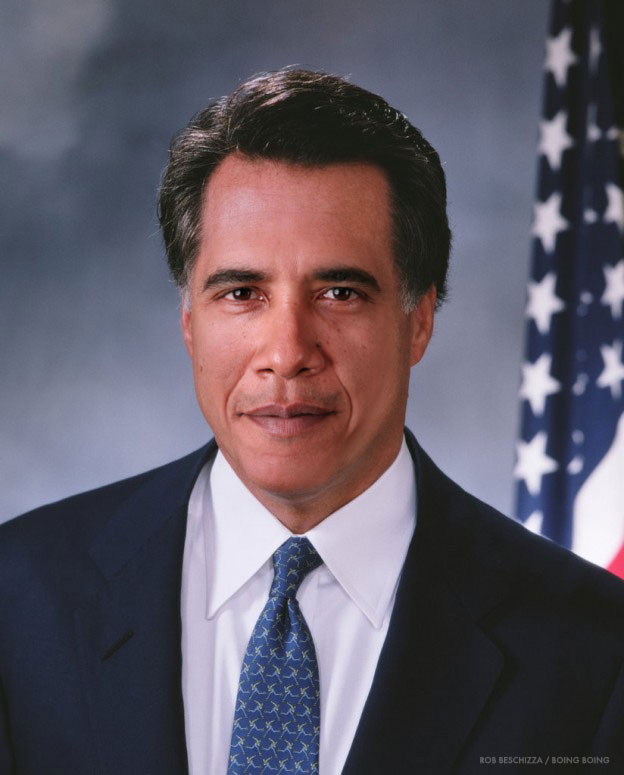
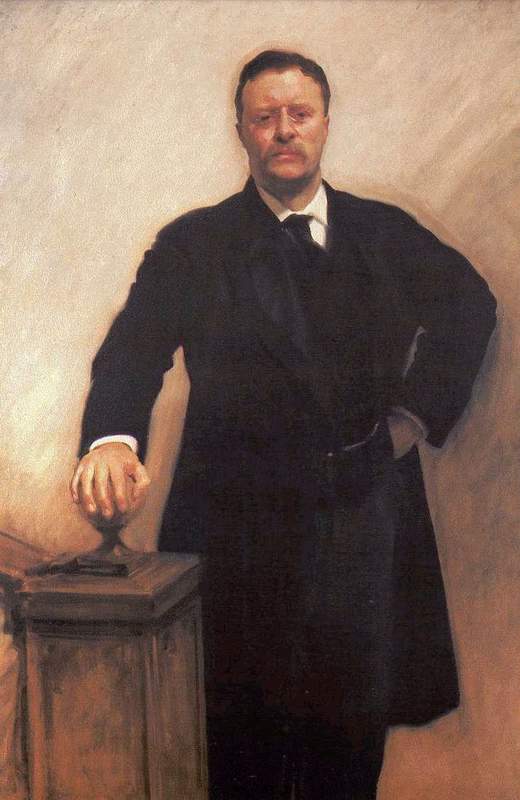
Contrary to the opinion of some — including Barack Obama, apparently — independent voters are not attracted to “safe”, middle-of-the road candidates. They are attracted to candidates who can convey passion and vision in an appealing way. This is why independents voted overwhelmingly for Ronald Reagan — and also for Barack Obama. These men offered strikingly different visions of America and how its government should work, but both made people feel good about America, made them feel that America belonged to them, and to the future.
Retreating from the vision he conveyed so powerfully during his campaign, trying to govern from a wishy-washy middle, with no discernible passion or convictions, Obama has totally lost independent voters and much of his base. He is taking down the Democratic Party with him. Meanwhile, the Tea Partiers, with an excess of passion, though a somewhat wobbly vision, are attracting the independents who put Obama into office. The Tea Party has no coherent or rational program, but it has stolen the narrative that Obama won with — this country belongs to us, it's broken and we can fix it.
That the Tea Party can have had such success without a program is evidence that the nation is ready for a third party. A third party of genuine vision, with the passion of the Tea Party but eschewing its uglier and nuttier aspects, could change the face of American politics.
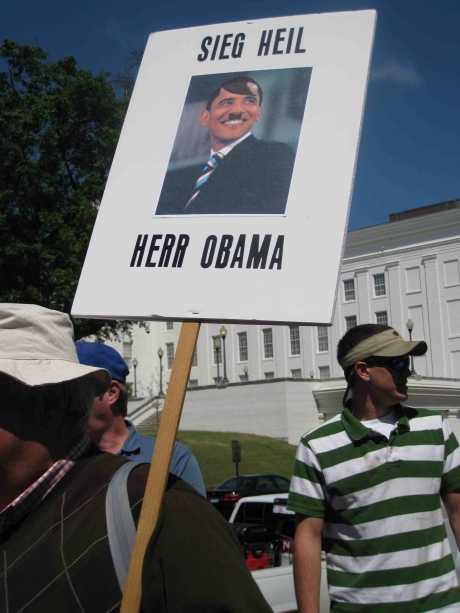
Fully one half of American citizens today between the ages of 19 and 29 identify themselves as independents — they have no loyalty to either of the major parties. That percentage is not likely to fall in the years ahead, given the current unattractiveness of the major parties, and new generations coming of voting age will likely swell their ranks decisively. (Within five years, millennials will represent one third of the electorate.) This means that one major barrier to the success of a third party, the inertia of trans-generational party loyalty, is crumbling before our eyes.
The extremism of the Tea Party fringe is creating quiet but real unease among moderate Republicans, and the Democratic Party's outright betrayal of its progressive base is creating divisions on the left that are becoming increasingly bitter.
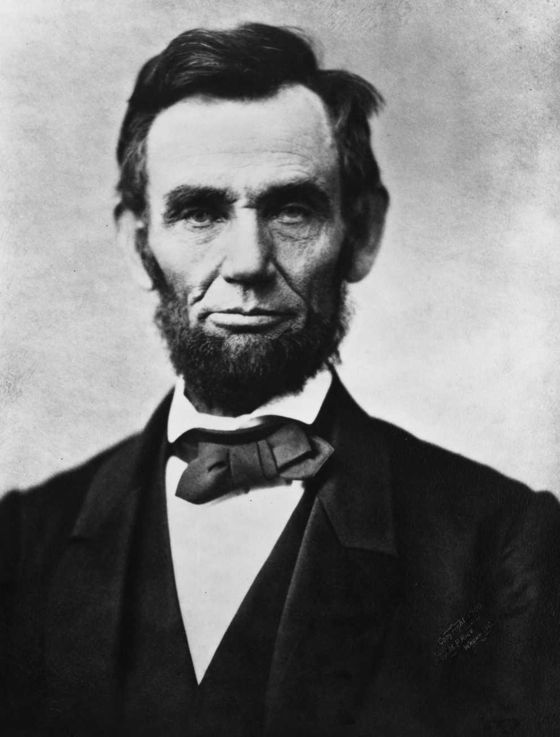
These are the kinds of conditions that have given birth to successful and near-successful third parties in America's past. The withering of the Whig Party and the divisions in the Democratic Party opened a way for the Republican Party in 1854. The Republicans, with their passion and vision, put their candidate, Abraham Lincoln, into the Presidency in 1860, just six years after the party was founded.
In 1912, when the former Republican President Teddy Roosevelt felt that the current Republican President Taft had betrayed the progressive ideals of the Republican Party, TR founded the American Progressive Party, popularly called the Bull Moose Party, during the election year, and it actually outpolled the Republican Party in the elections. There's no telling what success TR might have had if he'd founded his party even a year earlier.
This is one reason for progressives to stop rewarding Democrats for their failure and cowardice and to start looking for an alternative immediately. With the failure of TR's third party in 1912, common-sense trust-busting progressivism would never again be a significant force on the American right. If the anti-slavery activists of 1854 had decided to stick with the foundering Whig Party for just a few more years, hoping it would come to its senses, there might never have been a President Abraham Lincoln. There is a tide in the affairs of men . . .
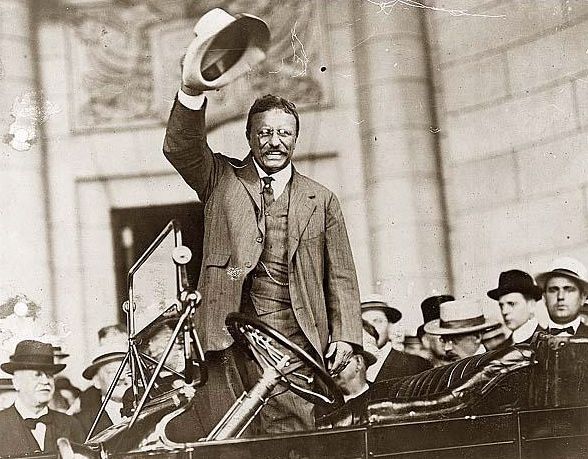
The first tenet of TR's Progressive Party was this — “To destroy this invisible Government,
to dissolve the unholy alliance between corrupt business and corrupt
politics is the first task of the statesmanship of the day.” This is a philosophy directly relevant to the crisis of our own times, a crisis in which the survival of our democracy, under assault from the organized monied interests, the “trusts”, as TR would have called them, is at stake. It's a philosophy that, properly framed by a charismatic leader, could draw support from the baffled but passionate Tea Partiers and from the disenchanted Democratic base. Most importantly, it could appeal powerfully to the young, independent voters whose numbers are swelling rapidly.
The time has come.
I agree with Barack Obama that this nation needs to have an open, civil, humane and respectful conversation about divisive cultural issues like gay marriage. I would even agree that the conversation needs to include neurotic homophobes like Rick Warren, a man who went out of his way to hurt and shame homosexuals by comparing their behavior to pedophilia — the sexual exploitation of children, a form of rape.
Recently, Warren has refused to condemn the view of an African pastor he’s worked with who believes that gays should be put to death. “I don’t take sides in matters like this,” Warren has said. He doesn’t takes sides on the issue of putting people to death for their sexual orientation? He has apparently joined the Church Of St. Pontius Pilate. (We shouldn’t be too surprised — this is the most popular religious denomination on the face of the earth.)
It’s hard to imagine how a man like Warren could converse openly, civilly and respectfully with people he considers the moral equivalent of child molesters, of rapists, a man who refuses to condemn the murder of gays because they are gay. But many people share Warren’s irrational and hysterical attitude to gays and lesbians and they are Americans, too. Their attitude was formed either by social conditioning or by personal conflicts about their own sexuality, which aren’t crimes, after all . . . though perhaps not easily conducive to the kind of good-faith dialogue this nation needs.
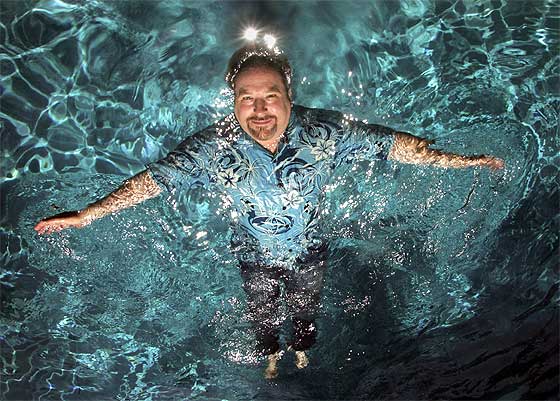
The irrational nature of Warren’s views about gays and gay marriage is reflected in the intellectual dishonesty of his arguments, one of which is that all cultures and all religions have for five thousand years defined marriage as a union between a man and woman, whereas is fact many cultures and religions, including Judaism at one time, have also defined or do define marriage as a union between one man and several women. Warren is strongly against polygamy, however. It’s his prerogative, I guess, to pick and choose between historical precedents about the definition of marriage, but he certainly can’t claim any kind of intellectual integrity while doing so.
Warren is also a hypocrite. He doesn’t allow “unrepentant” homosexuals to join his church, and used to state this policy very clearly on his church’s web site. During the controversy over his role in Obama’s inauguration, however, this statement was removed from the web site. The policy hasn’t changed, presumably — Warren just doesn’t want too many people to know about it. Is it necessary to point out that if Jesus had directed his ministry only at the “repentant” he would have spent his whole life sitting on a rock somewhere waiting for the imaginary saints to show up to get the good word?
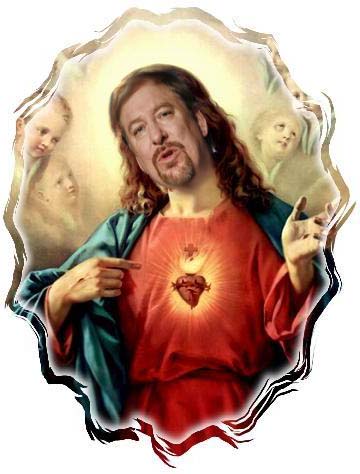
But even if neurotic, irrational and hypocritical folks like Warren have a place in the national conversation about homosexuality, why must they drown out the voices of the non-neurotic and honest opponents of gay marriage? There are thousands of religious figures in America who oppose gay marriage but don’t feel compelled to insult and humiliate gays, or to stand silent when there’s talk of murdering them, while making the case for their opinion. Doesn’t the media have some responsibility to present sane viewpoints on this subject, even as it reports on the lunacy of popular kooks like Warren?
In Christian theology, we are all guilty of putting Jesus to death — i. e. we’ve got nothing on P. Pilate — and are all relieved of the sin of this by Jesus’s sacrifice. But even Pontius Pilate had the common decency, or perhaps just the good taste, not to show up among the disciples after the crucifixion, offering to buy them all a drink and let bygones be bygones — much less start a church in Jesus’s name. The disciples would undoubtedly have been too shocked by this to be insulted — they would have more likely tried to get the poor guy some professional help. Rick Warren needs our love, like everyone else, but he also needs lots and lots of therapy and he needs to be recognized as the deranged and tragic figure he is.
It shouldn’t be forgotten that Warren does a lot — really a lot — of good charitable work around the world. But is it too much to hope, in this Christmas season, that he might someday read the Gospels he pretends to preach — he must have a copy of them lying around somewhere — and find his heart touched by their message? (Hint to Pastor Rick — the take-away from those books is neither “Crucify him!” nor “I wash my hands of him”.)
Yes — the President-elect of the United States Of America is cool.
This is going to take some serious getting-used-to.
I just created a section, over to the left there, called Politics 2008, where all my political posts are now collected. I had no idea there were so many of them — I got a little carried away and didn't realize how much I was obsessing on the race. Some of the writing is too shrill, some is downright hysterical — all of it is interesting to read in retrospect, or will be one day when the hangover from this long campaigning season eases a bit. I can't really apologize for writing so much about the election, however, since it would have been impossible for me not to write about it.
One of the subjects that interests me most is the survival, in disguise, of 19th Century forms into the 20th and now the 21st Centuries. In the 19th Century, politics was a major feature of American popular entertainment — people read newspaper reports of politics the way we read gossip magazines, people went to see political speeches and debates the way we go to the movies (or used to go to the movies.) This year, gossip and movies seemed a tepid brew indeed compared to the drama and spectacle of the race for the Presidency. In this age of television and the Internet, hundreds of thousands of people felt it was important to show up in person at Barack Obama's rallies — to share a real space with him. An image on a screen wasn't enough.
The Victorian world is always with us — we only dreamed that we left it behind — and sometimes it doesn't even wear a disguise. When Obama is sworn in on the steps of the Capitol this January, you can be sure he'll quote Abraham Lincoln. In a very real sense, Lincoln will be standing beside him. As William Faulkner once wrote, in some lines Obama has already quoted, “The past is never dead. It's not even past.”
Sure, Obama made masterful use of the Internet in his campaign, but one of the things he used it for was to get us to listen again to the voices of our ancestors.
The image above was taken in the Ebenezer Baptist Church in Atlanta, where Martin Luther King preached, at the moment the networks called Barack Obama's victory in the 2008 Presidential election.
Bob Herbert in The New York Times writes of 4 November:
It can be easy in such a moment of triumph to lose sight of the agony
wrought by the unrelieved evil of racism and to forget how crucial a
role anti-black racism played in shaping American life since the first
slaves were dumped ashore 400 years ago.
Blacks have been holding fast to the promise of America for all that
time. Not without anger. Not without rage. But with a fidelity that in
the darkest moments — those moments when the flow of blood seemed like
it would never stop, when enslaved families were wrenched apart, when
entire communities were put to the torch, when the breeze put the
stiffened bodies of lynched victims in motion, when even small children
were murdered and Dr. King was taken from us — even in those dire
moments, African-Americans held fast to the promise of America with a
fidelity that defied logic.
The multiracial crowds dancing with unrestrained joy from coast to
coast on Tuesday night were proof that the promise of America lives —
and that you can’t always hang your hat on logic.
We probably shouldn't forget that the epic of hope lived out by black
America was rooted in faith. White America, in its hypocrisy and
complacency, believed that converting black slaves to Christianity
would reconcile them to their “place” in “Christian” society. Even the
influential abolitionist Harriet Beecher Stowe turns the rebel Topsy
into a missionary at the end of Uncle Tom's Cabin and sends her off to
Africa to be with and convert “her people”.
Abolitionists saw blacks as their brothers and sister in God, but in an abstract theological sense — almost
none of them imagined, or would have accepted for a moment, blacks as fellow citizens, living in social (as opposed to political or theological) equality
with whites on American soil.
It was a different view of Christianity that elevated blacks to a sense
of absolute equality with all people everywhere, even ole massa, even the kind-hearted Harriet, and
fired them with the conviction that God, in his good time, would free
them from bondage of every kind, including the separate-but-equal kind, as he had freed the people of Israel.
Blacks took the radical message of Rabbi Jeshua bar Joseph straight,
and made a long, painful bet on his promises being fulfilled. It was
their courage and perseverance that gave the promises flesh, through
rivers of blood and generations of sacrifice, but it was the illogical
faith that made the courage and perseverance possible.
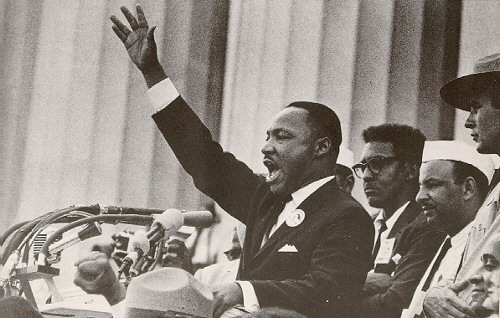
The Reverend Martin Luther King dreamed of a day when America would
“rise up and live out the true meaning of its creed” — and he wasn't
just talking about the opening words of the Declaration Of
Independence. White American Christians were and are sitting on a time
bomb, which they have tended to consistently misread as a license to preserve the
social and/or political status quo, whatever it happens to be, or to recover a status quo whose passing they regret. Black
American Christians have consistently seen deeper into the rabbi's more dynamic and subversive — and illogical — vision.
“Hope is not a strategy,” says evangelical white “Christian” Sarah
Palin. In fact, according to the rabbi's teaching, hope is the one infallible strategy. As Bob Dylan
once sang:
There's a lone soldier on the cross, smoke pouring out of a boxcar door —
You didn't know it, you didn't think it could be done, in the final end he won the war
After losing every battle.
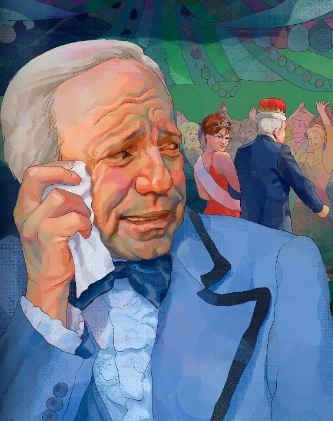
After the prom-night tragedy, Joey was never quite the same.
Not that it worked out all that great for Johnny and 'cuda, either.
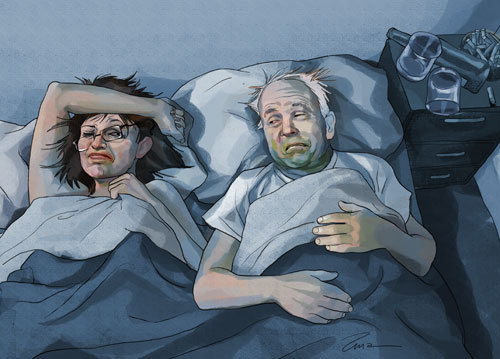
[Images by Zina Saunders via Boing Boing.]
These are great days, indeed . . .
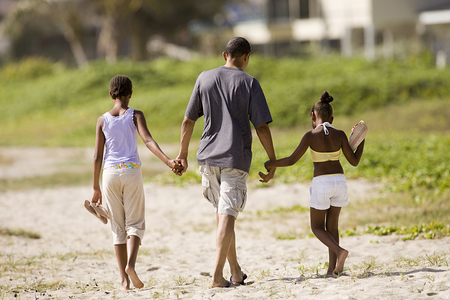
It's still a little hard to believe.
For the first time in its history America has elected a President who was born in Hawaii.
I never thought I would live to see this day.
Mrs. L. is an elderly black woman who lives here in Las Vegas. I'm guessing she's in her nineties, and she gets around with a walker/chair device. She won't allow herself to be pushed in the chair, for two reasons. One, she wants to get as much exercise as she can. “If I stop using my legs,” she says, “I'll lose them. Then where would I be?” Two, she doesn't trust anyone to push her. “I let someone push me once,” she says. “They took a turn too fast and we both went over. So now when someone says, 'Can I push you?' I say, 'No, thanks.'”
Mrs. L. wanted to vote yesterday and the Obama campaign asked me to drive her to her polling place, which was about half a mile from her home. She lives in an apartment complex for seniors close to where I live. I had to walk down a long corridor to her apartment. She was sitting outside her door in her walker-chair waiting for me. She was dressed to the nines, wearing a bright purple blouse that looked brand new, a stylish floppy white hat with a brim, a necklace with big white plastic beads, white slacks and white sandals with flower decorations. She looked like a million bucks — and she meant to.
She had a hard time getting into the front seat of my big car. She was thrilled when I offered her a Coca-Cola, and even more thrilled when she tasted it. “That's the real thing!” she exclaimed. I told her it was a Mexican Coke, made with real sugar — “like when we were kids.” “They don't taste like this anymore,” she agreed.
I helped her through the voting procedure at the poll set up in the recreation lounge of a senior center. There were a lot of older people there to vote, but they all looked at Mrs. L. with astonishment — she was older by far than all of them. “How old is she?” a woman whispered to me. “I don't know,” I said. “I'm afraid to ask.” “God bless her for getting out to vote,” the woman said.
Mrs. L. grew up in Indiana — “I'm what they call a Hoosier,” she said. She moved to Las Vegas several years ago, after her husband died, because she has a daughter who lives here, but her daughter is in bad health. She has grandchildren and great-grandchildren. She is a person of great personal dignity — which is why I wouldn't have dreamed of asking her age.
When the poll workers had trouble locating her name in their bound pages of district voters, Mrs. L. said, “I know my name is in that book.” It was, and she added her signature for the 2008 election in a steady hand, with big, bold, elegant letters.
Afterwards, getting back into the car, she said, “Well, that's done.” “We've been part of history today, Mrs. L.” I said to her. She shook her head in amazement. “Yes, we have. Yes, we have.” “It just goes to show that if you live long enough,” I said, ” you'll see everything eventually.” She laughed delightedly and said, “Isn't that the truth?”
When I said goodbye to her back in her super-clean, sparsely furnished apartment, and shook her hand, she said, “If there were more people like you and me, the world would be a better place.” I had to beat a hasty retreat before she saw I was crying. It wasn't just the kind compliment that got to me — it was more a delayed reaction to something that happened as we drove away from the polling place. We passed a young black woman walking up to vote who had her five or six year-old daughter with her. Mrs. L. addressed the child under her breath, “You put your name in that book, too, little girl. You write your name in that book.”
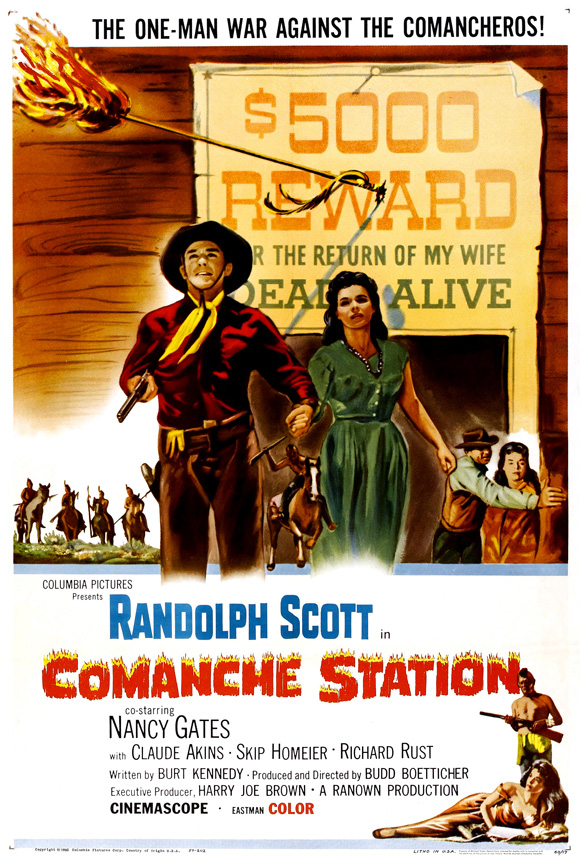
Well, tomorrow is the big day — five of the Randolph Scott/Budd Boetticher Westerns are going to be released on DVD for the first time, including Boetticher's masterpiece Comanche Station. The box set will mark a major moment in American film culture — a chance for many to see these extraordinary films for the first time. Though not as profound as Ford's Westerns, spiritually speaking, Boetticher's oaters are almost as exquisite cinematically, though in a subtle, quiet way. They're largely about the way men, on horseback and on foot, move through landscapes, inhabit space, and how this activity reveals who they are and what they're about. On that level they're examples of pure cinema, since only cinema can operate on that level.
Apparently there's some sort of election going on tomorrow as well, which will also be worth paying close attention to. I've posted a link to this clip before, but give it another look as we await the morrow's events:
This is Bob Dylan, joined by Joan Baez, singing Dylan's song at the march on Washington, 28 August 1963, the occasion of Martin Luther King's “I Have A Dream” speech. In the song, Dylan, twenty-two years-old, envisions, like King, a time when the dreams of the civil rights movement will be fulfilled. Like King, also, he draws on Biblical imagery, on the rhetoric of prophecy, which alone seemed appropriate then to such awesome hopes, bucking such awesome tides.
Today, the hour when the ship comes in may feel as though it was always inevitable. Back then, it was only proclaimed with assurance by voices crying in the wilderness, by those who put their strongest faith in God's justice, not man's. The times when the two converge are rare, times of jubilee.
Today just after dawn I found myself driving into the rising sun on Sunset Road, heading to Coronado High School in Henderson, Nevada, an upscale suburb of Las Vegas. I was going there to hear Barack Obama speak. It was the second time I'd tried to attend one of his Las Vegas rallies. The first time, at a much bigger venue and a far less ungodly hour, I hadn't been able to find a parking space within walking distance of the stadium he was speaking at.
This time I found an empty lot, a little patch of undeveloped desert, behind a business park about a mile from the high school. As I walked to the school I saw cops on horseback patrolling the closed-off street in front of it — who knew that Las Vegas had horse cops?
A relatively small crowd turned out — around three thousand according to the estimate of police on the scene. It didn't look like a Henderson crowd — it had a working-class feel. It was about two-thirds black, with lots of African-American families in attendance — many mothers and fathers holding their small children up on their shoulders to get a glimpse of the man who might become the first African-American President. You couldn't help but be moved by the sight.
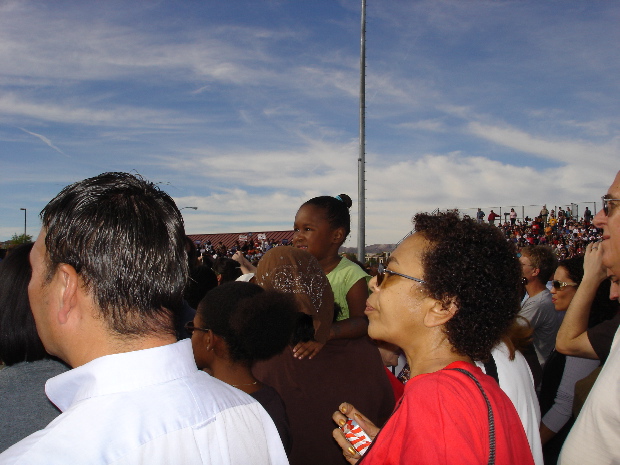
I was also there mainly to be a witness to history in the making. I wanted to see “that one” in person just once. It took a while for things to get going. Along with a bunch of other truants I sneaked off behind the bleachers to have a smoke. (Big Nanny is turning America into an extension of high school by other means, to paraphrase a friend of mine.)
I sat on a low wall and puffed away with two young Latino kids, heavily pierced and tattooed. From the other side of the bleachers we heard things getting going, as someone sang “The Star-Spangled Banner” over the PA. The two Latino kids got up, took off their baseball caps, placed their hands over their hearts and stood at attention during the song. I did the same. We all clapped afterwards. Then I headed back to the field.
Senator Harry Reid managed to send the once-excited crowd into a funereal mood during his introduction of Obama. His speaking voice and style of oratory have the precise clinical effect of Ambien. Obama's appearance changed all that in an instant — the crowd went nuts as the tall, slim figure in shirtsleeves took the podium, looking very young and very weary. But he spoke well. Just before he came on I noticed that I'd lost my car keys, which distracted me a great deal during the speech. I'd heard it all before — it was his standard stump oration — so there was no great loss. You can just make out Obama below, between the woman's upraised hands:
The first time Obama mentioned John McCain the crowd started booing. “No, no, no,” Obama admonished. “You don't have to boo — you just have to vote.” The crowd gave him its most rousing cheer of the day. That's how a decent man campaigns for office in America — and how he encourages Americans to get excited and feel good about humane political discourse.
Afterwards I tried to locate someone who might know if there was a lost and found station where misplaced keys might turn up. The campaign workers and the cops were incredibly kind and sympathetic, but there was no lost and found station. Finally a campaign worker made an announcement that lost car keys should be brought to the stage, but none were.
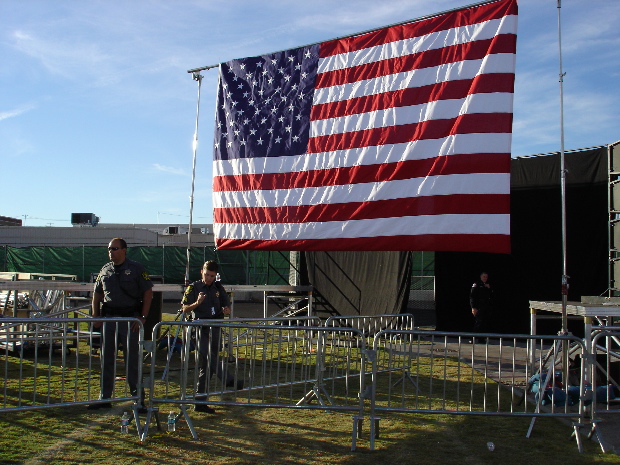
At about this time I was interviewed by a Japanese TV crew about the rally. I tried to be cheerful about Obama and not look like a guy stranded in Henderson, Nevada without wheels and without apartment keys. A day of extreme vexation and very expensive taxi rides loomed ahead. I think the Japanese reporter, a cute young woman, chose to interview me because I was wearing a cowboy hat — that would probably play well back in Japan. She looked as though she was having a hard time holding back giggles when she asked her questions.
I decided to make one last inquiry at the security station at the entrance to the field. “Car keys?” said the cop I asked about a lost and found station. “See if they're in that pile there.” He pointed to a big pile of car keys at the bottom of a fence post. My keys were on top. I have no idea where I lost them or who found them. They probably fell out when I was sitting on the low wall smoking — so it may have been the Latino punks who found them and turned them in. God bless whoever it was.
Another miraculous day at the end of Campaign '08.
Today was the last day of early voting in Nevada so I went down to my local Obama field office to volunteer to drive voters to the polls. I thought there would be a big rush to vote early on this last day, and so did the folks at the field office, but in the end I just got one assignment — a young man named Scott who lives in a modest apartment complex about fifteen minutes from my house. He'd been contacted by an Obama volunteer named Laura who also lives in the complex. Scott doesn't have a phone so I rendezvous-ed with Laura and she brought Scott out to my car.
Scott had a two-hour window for voting — I picked him up at noon and he had to be back at 2 o'clock to look after his kids when his wife went off to work. I got a feeling that things weren't going too well for Scott in Las Vegas, economically speaking. He mentioned that he was thinking of moving to North Carolina, because he'd heard the job opportunities were better there. He was excited about Obama but took the rest of the ballot just as seriously. He'd already been to a polling place to get a sample ballot so he could study it. He had with him a hand-written list of the candidates he wanted to vote for for local offices.
He was pleasantly surprised when I offered him some Gatorade from a cooler in the back of The Ghost — I wanted to be prepared just in case people had to wait for a long time in lines outdoors. “You've got ice, too,” he said. “We should go fishing after this!” We talked about how much we loved fishing.
His local polling place was located in the Sears Court of the Meadows Mall — seen above without the election machinery in place. (Nevada is way ahead of the rest of the country when it comes to making voting convenient — there are early voting stations in supermarkets as well.) There looked to be about fifty voting machines in the center of the court, with a long line of people waiting to use them. When we joined the back of the line an election board volunteer told us the wait would be about 13 minutes — and that's almost exactly how long it was.
Scott took a while at his machine, checking his list. Watching the crowd of voters while I waited for him I got very emotional. Here were a bunch of regular folks in a mall choosing the next leader of the free world. They all looked incredibly proud, almost beatific, as they handed off their election cards at the end of the process and received their sticker saying “I Voted”. For one moment each of them had stood in absolute equality with every other American citizen — their opinion absolutely equal to the opinion of anyone else.
You can try to appreciate the process of democracy intellectually and philosophically, but you can't get close to the miracle of it until you see it in action like this, when a phrase like “the blessings of freedom” suddenly comes alive and grips the heart.
When I dropped Scott off at his home afterwards we shook hands warmly. “Let's hope we'll be partying on Wednesday,” he said. I held up crossed fingers and he laughed. He was back in plenty of time to look after the kids and I'd helped a fellow citizen have his say in one of the most important elections in American history.
Earlier we'd been talking about how amazing the Obama organization was. “It's like we're all pulling together on this,” he said — a thirty-something black man from New Jersey talking to a fifty-something white man from North Carolina, thrown together by chance and hope at a momentous time in a shopping mall in the middle of the Mojave Desert.
America . . . it's just too much, just too cool.